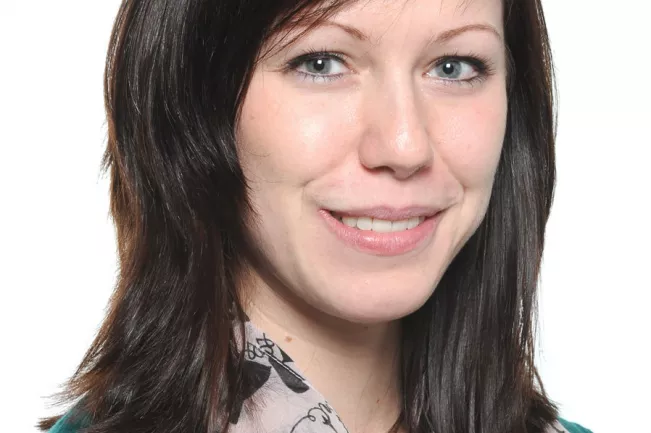Communications and Marketing | Alumni Office

Katrin Mertens, Applied Biology (BSc)

Kathrin Mertens could never have been enticed by vegetation science and the genetic code of Neanderthals. These aspects of biology had never really excited the Bonn A-level student. So when it came to choosing a degree programme, she couldn't warm to an all-rounder biology course. However, the medical-bioscientific focus of the "Applied Biology" programme at Hochschule Bonn-Rhein-Sieg struck a chord with her. Completing the academic programme in English didn't seem like too big a hurdle. On the contrary: the prospect of a semester abroad at one of the foreign partner universities with which her department in Rheinbach cooperates was what made this degree programme so appealing to Kathrin Mertens.
Biotechnology and medical microbiology quickly became her favourite subjects. Experimenting with self-tanning products and bioplastics in the laboratory awakened the spirit of research in her. As her grades were good, she was put forward for the coveted semester abroad.
Setting the course for research
During her year abroad at Robert Gordon University in Aberdeen, Scotland, the student developed her enthusiasm for applied clinical research. And so, at the end of her studies in Aberdeen, she not only gained a double degree from both universities, but also a Bachelor's degree with Honours.
This left the German graduate with a crucial question: return to Germany? Look for a job? Or start a doctoral programme at the renowned University of Aberdeen? Another three years at university? In return, an exciting research project of her own beckoned and, last but not least, a doctorate in turbo speed, which would hardly have been possible at a German university. Not an easy decision for someone in their early twenties who originally only wanted to go abroad for a semester... Fortunately, she still had close contacts at the university and one of her professors convinced her to take up the PhD opportunity.
Kathrin Mertens worked with cell cultures for her doctorate in Aberdeen and researched the influence of zinc deficiency on certain molecular mechanisms in the event of blood poisoning. The doctoral thesis also included her own clinical study - and over time, the doctoral student realised that she not only enjoyed the work in the laboratory, but also the planning, organisation and communication challenges of the research work enormously.
The island becomes her new home
After completing her doctorate, she took on the role of Trial Manager in a larger epidemiological study in Aberdeen. There, the biologist coordinated the scientific investigations on arthritis patients in 14 participating hospitals. "Sometimes I missed working in the lab - but in the end I really enjoyed the management task," she says. Her success proved her right, as the next step in her career followed in November 2014: since then, she has been working at the renowned Institute of Cancer Research (ICR) in London as Research Study Co-ordinator of a large breast cancer study.
What does she sometimes miss in the UK? Her family and friends, of course. She has probably also had to accept a few compromises in terms of living standards. But apart from that, she can only think of one thing off the top of her head: ready-made herb mixes for her salad. Well, I guess Mrs Doctor will have to go into the garden herself - and at least practise herbalism with chives, dill and chervil.